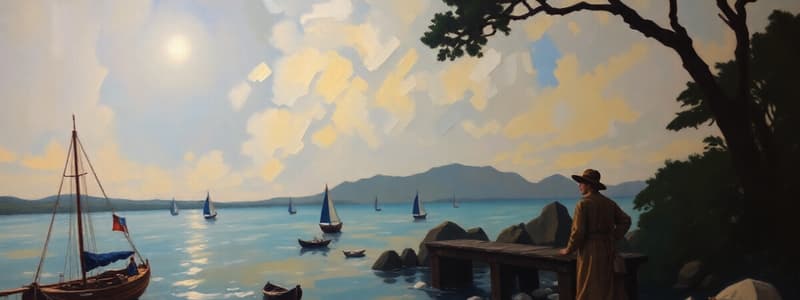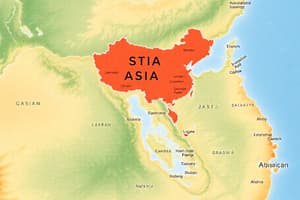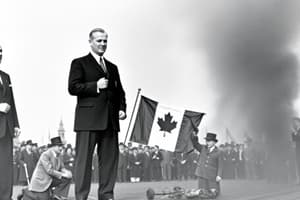Podcast
Questions and Answers
How many fully independent countries are there in the Pacific region?
How many fully independent countries are there in the Pacific region?
- 7
- 8
- 10
- 9 (correct)
Which of the following is NOT a factor contributing to political instability in the Pacific Islands?
Which of the following is NOT a factor contributing to political instability in the Pacific Islands?
- Healthcare systems
- Corruption
- Employment
- Cultural festivals (correct)
What percentage of New Caledonia's population identifies as Kanak?
What percentage of New Caledonia's population identifies as Kanak?
- 25%
- 40% (correct)
- 35%
- 50%
What is one concern of the pro-independence movement regarding the electoral reform in New Caledonia?
What is one concern of the pro-independence movement regarding the electoral reform in New Caledonia?
Which of these regions is considered a dependent territory under the United States?
Which of these regions is considered a dependent territory under the United States?
Which country in the Pacific has a governance issue characterized by increasing authoritarianism?
Which country in the Pacific has a governance issue characterized by increasing authoritarianism?
Which group constitutes the majority of immigrants in New Caledonia?
Which group constitutes the majority of immigrants in New Caledonia?
What is the primary concern related to housing and land in the context of political instability?
What is the primary concern related to housing and land in the context of political instability?
What was one primary goal of colonial politics?
What was one primary goal of colonial politics?
What was the purpose of the Tripartite Convention of 1899 regarding Samoa?
What was the purpose of the Tripartite Convention of 1899 regarding Samoa?
Which country was associated with military governance in Samoa until 1962?
Which country was associated with military governance in Samoa until 1962?
What significant political change occurred in Samoa in 1990?
What significant political change occurred in Samoa in 1990?
Which of the following describes the status of the kanak majority in New Caledonia during colonial times?
Which of the following describes the status of the kanak majority in New Caledonia during colonial times?
What is the primary role of log-gongs in traditional Pacific politics?
What is the primary role of log-gongs in traditional Pacific politics?
How are leaders chosen within tribes according to traditional practices?
How are leaders chosen within tribes according to traditional practices?
What was a significant factor in the early phase of Pacific colonization?
What was a significant factor in the early phase of Pacific colonization?
What distinguishes the colonial approach of the British compared to the French in the Pacific?
What distinguishes the colonial approach of the British compared to the French in the Pacific?
Which Pacific country was formed through a condominium colonization process?
Which Pacific country was formed through a condominium colonization process?
What element is most notably absent in the choice of leaders in traditional Pacific tribes?
What element is most notably absent in the choice of leaders in traditional Pacific tribes?
Which of the following accurately describes the state of New Caledonia?
Which of the following accurately describes the state of New Caledonia?
What was a major outcome of European colonization of the Pacific Islands in the 19th and 20th centuries?
What was a major outcome of European colonization of the Pacific Islands in the 19th and 20th centuries?
What political systems exist nationally in Samoa?
What political systems exist nationally in Samoa?
How many MPs in Samoa are matai?
How many MPs in Samoa are matai?
What type of law is primarily used to deal with civil and criminal matters locally in Samoa?
What type of law is primarily used to deal with civil and criminal matters locally in Samoa?
What year did Vanuatu gain its independence?
What year did Vanuatu gain its independence?
What is the average percentage of Gross National Income (GNI) represented by Overseas Development Aid (ODA) in recipient countries?
What is the average percentage of Gross National Income (GNI) represented by Overseas Development Aid (ODA) in recipient countries?
Which Pacific island country has a political system that includes a king, prime minister, and tribal chiefs?
Which Pacific island country has a political system that includes a king, prime minister, and tribal chiefs?
Which of the following statements about Gross National Income (GNI) is correct?
Which of the following statements about Gross National Income (GNI) is correct?
How is local politics primarily characterized in Pacific island countries?
How is local politics primarily characterized in Pacific island countries?
Flashcards
Political instability in Pacific Nations
Political instability in Pacific Nations
Political issues and conflict frequently occurring in Pacific Island nations due to various factors like employment, immigration, and governance challenges.
New Caledonia's unique status
New Caledonia's unique status
The only non-independent Melanesian country, facing political tension due to its diverse population (Kanak, European, other immigrants) and historical inequalities related to land, employment, and education.
Electoral reform in New Caledonia
Electoral reform in New Caledonia
New Caledonia's electoral rolls have been frozen since 2007, affecting which voters get a voice in the elections and contributing to political tension.
Pro-independence movement
Pro-independence movement
Signup and view all the flashcards
Melanesia's political status
Melanesia's political status
Signup and view all the flashcards
Political diversity's impact
Political diversity's impact
Signup and view all the flashcards
Main factors in political instability
Main factors in political instability
Signup and view all the flashcards
Pacific political systems
Pacific political systems
Signup and view all the flashcards
Pre-colonial Pacific politics
Pre-colonial Pacific politics
Signup and view all the flashcards
Ancestors' spirits in Pacific Politics
Ancestors' spirits in Pacific Politics
Signup and view all the flashcards
Colonial Pacific politics (beginnings)
Colonial Pacific politics (beginnings)
Signup and view all the flashcards
Colonial Scramble for Pacific
Colonial Scramble for Pacific
Signup and view all the flashcards
Traditional Authorities kept as advisors (colonial)
Traditional Authorities kept as advisors (colonial)
Signup and view all the flashcards
Vanuatu Condominium Colonization
Vanuatu Condominium Colonization
Signup and view all the flashcards
Vanuatu's Independence
Vanuatu's Independence
Signup and view all the flashcards
Traditional Political Structures (Pacific)
Traditional Political Structures (Pacific)
Signup and view all the flashcards
Colonial Politics
Colonial Politics
Signup and view all the flashcards
Samoa's Special Case
Samoa's Special Case
Signup and view all the flashcards
Limits of Colonial Politics
Limits of Colonial Politics
Signup and view all the flashcards
Samoa's Political Development
Samoa's Political Development
Signup and view all the flashcards
Samoa's Political System
Samoa's Political System
Signup and view all the flashcards
Pacific Island Politics
Pacific Island Politics
Signup and view all the flashcards
Tonga's Political System
Tonga's Political System
Signup and view all the flashcards
Overseas Development Aid (ODA)
Overseas Development Aid (ODA)
Signup and view all the flashcards
GNI and ODA
GNI and ODA
Signup and view all the flashcards
Impact of ODA
Impact of ODA
Signup and view all the flashcards
Study Notes
Pacific Political Instability Overview
- Twenty-two Pacific nations exist.
- New Caledonia is the only non-independent Melanesian country.
- Political diversity often correlates with instability.
- Nine fully independent countries are Tonga, Samoa, Fiji, and Vanuatu.
- Five states are in a free association with the US/Cook Islands, including Palau, FSM, Marshall Islands, and Niue.
- Eight dependent territories are under US/French control.
- Hawaii and Rapanui are missing from the list.
Main Factors of Political Instability
- Employment is a key factor.
- International immigration presents a challenge.
- Rural-urban migration is contributing to housing and land pressures.
Health and Governance
- Health systems and gender issues are important considerations.
- Corruption is a concern.
- Nauru is increasingly authoritarian.
- Fiji democracy is sometimes influenced by military intervention.
- Political issues affect PNG (poverty, gender politics, and strong kinship).
- New Caledonia (French Polynesia, Hawaii, and New Zealand) have autonomy concerns.
- Melanesia is a political hotspot today.
New Caledonia
- Population of 268,000.
- Kanak (40%) arrived 3,000 years ago.
- Europeans (25%) are descendants of colonists from the 19th century.
- Recent French arrivals ("metros" or "zoreills") live temporarily.
- Other immigrants (35%).
- Kanak youth experience extreme marginalization in society.
- Many Kanaks have only a junior high school certificate.
- Electoral rolls for provincial elections in New Caledonia remain frozen at the 1998 level, per accord.
- 25,000 new voters are expected in 2024, increasing the total electorate.
- Local residents (citizens and 10-year residents).
- The pro-independence movement wants to retain the current electoral structure.
- Accessing information about sensitive issues proves difficult.
- Around 6000 people work in the security sector (including 2500 gendarmes).
- Military figures are at 1650.
Traditional Pacific Politics
- Ancestors' spirits -> kingdoms -> customary areas -> tribes -> family clans.
- Log-gongs are used to call people with decorations representing ancestors.
- Vahiné Pomare IV is a deposed queen of Tahiti.
- Kingdoms and queens: in 2016, Filipo Katoa became the 38th Tu'iagaifo king in Futuna.
- Queen Tenia'makui of Tabwewa village, Banaba.
- King Tupou Vland queen Nanasipau'u of Tonga.
- Fijian Chiefs (1895).
- Customary areas.
- Tribes (chieferies).
- Authority is sometimes hereditary.
- Contact with ancestors' spirits and favors often contribute to leadership.
- Livestock sacrifice and favors shape leadership.
- There are chiefs who are more symbolic, not real leaders.
- 39 languages exist in New Caledonia.
- 8 customary areas, 57 chefferies, and 341 tribes.
- Clans total between 4,000 to 5,000.
- Population of New Caledonia is diverse.
Colonial Politics
- Early settlement (1790-1860) led to Pacific colonization.
- International scramble for influence started in 1788.
- 171 islands form Tonga (45 inhabited).
- Fijian soldiers worked for private British colonizers.
- Traditional authorities were kept by the British as advisors.
- French replaced traditional leaders with colonial policies enforced from Paris.
- 25,000 Pacific islands were grouped by 19th and 20th-century European colonizers.
Vanuatu (Special Case)
- French/English Annexation in 1906.
- Condominium colonization (Franco-British) from 1906-1980.
- Vanuatu became independent in 1980.
- Empire building and increased wealth for Europe were aims.
- Additional populations arrived to foster certain countries.
- Competition among European countries.
- Imposing their own cultures on the locals.
- Exploitation of resources (nickel, minerals, guano).
- Creating infrastructure, like roads and wharves.
- Blackbirding, importing people from Fiji to other places.
Samoa (Special Case)
- Tripartite Convention of 1899 divided Samoa into areas controlled by Germany, the US, and the UK.
- Political and economic development was impacted by the division.
- German Samoa (1899-1919).
- Similar to Australia, New Caledonia was used as a penal colony from 1853-1913.
- English Samoa (1899-1962).
- Kanak majority resided in reserves (10% of land).
- Forced labor, in ranches, plantations, and public works, was assigned to them.
Samoa (1962-Present)
- Universal suffrage arrived in 1962, with voters and candidates becoming Matai'l.
- Two Fautua (highest chiefs) were joint heads of state for life.
- Universal suffrage arrived in 1990, but only matai'i are political candidates today.
- Two political systems now exist: nationally (democratic and chiefly) and locally (village-based chiefs).
- Decolonization details are shown on the 9th page.
Overseas Development Aid (ODA)
- ODA originates mostly from former colonizers. It's financial aid aimed at development, often in regions that were previously colonized.
- The average ODA percentage of Gross National Income (GNI) of recipient countries is 19%.
- Gross National Income considers income generation from within and outside a country.
- Remaining colonial infrastructure still exists.
- The Pacific Forum is now a full member of these former territories.
- Self-determination was a goal.
Positive and Negative
- New presidents from Pacific customary peoples.
- Close ties with former colonizers remain.
- Local politics are often about hereditary chiefs.
- China is investing in Pacific islands
- Christianity is prevalent.
- Corruption in development aid is a problem.
- Indigenous languages and cultures are endangered.
- Colonization depleted most natural resources.
Studying That Suits You
Use AI to generate personalized quizzes and flashcards to suit your learning preferences.




